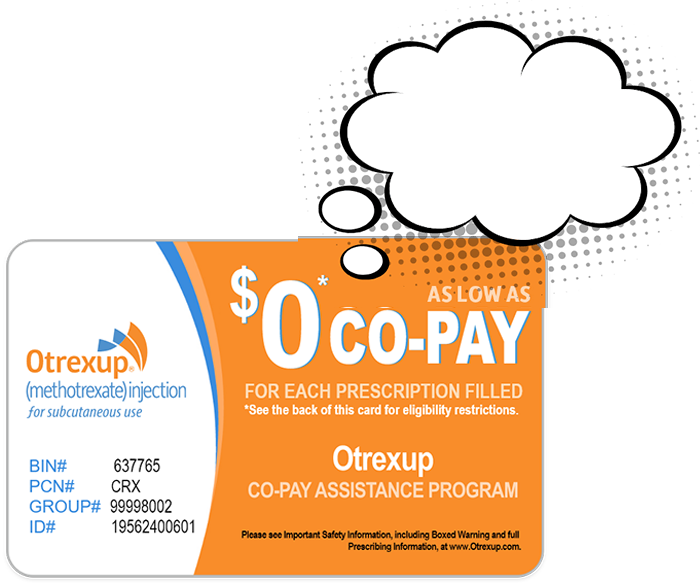Otrexup is nationally preferred on Prime
National coverage is available for your patients with commercial insurance.
Otrexup is preferred by these Blue Cross Blue Shield State Plans
- Blue Cross and Blue Shield of Alabama
- Florida Blue
- Blue Cross and Blue Shield of Illinois
- Blue Cross and Blue Shield of Kansas
- Blue Cross and Blue Shield of Minnesota
- Blue Cross and Blue Shield of Montana
- Blue Cross and Blue Shield of Nebraska
- Horizon Blue Cross and Blue Shield of New Jersey
- Blue Cross and Blue Shield of New Mexico
- Blue Cross and Blue Shield of North Carolina
- Blue Cross and Blue Shield of North Dakota
- Blue Cross and Blue Shield of Oklahoma
- Blue Cross and Blue Shield of Rhode Island
- Blue Cross and Blue Shield of Texas
- Blue Cross and Blue Shield of Utah
- Blue Cross and Blue Shield of Washington
- Blue Cross and Blue Shield of Wyoming

Patients with commercial insurance pay as little as $0* Co-Pay
The Otrexup Co-Pay Assistance Program may provide financial support to commercially insured patients to assist with out-of-pocket costs of Otrexup. Eligible patients* may pay as low as a $0 co-pay for each filled prescription. This co-pay assistance card is valid for up to 13 fills and may be renewed.
After the final refill, patients must sign up for a new card to continue to receive Otrexup co-pay support.
Your patients may receive co-pay assistance of up to $250 for each prescription filled by enrolling in the Otrexup Co-Pay Assistance Program. Your patients may download the CoPay card here.
Patients will receive a unique co-pay card. Patients should show this co-pay card to their pharmacist.
Otrexup Co-Pay Assistance Program instructions:

1
Patients present this card with a valid prescription to the pharmacist

2
Patients will receive co-pay assistance of up to $250 each time they fill their prescription

3
For any rejections, please ask the pharmacist to reprocess using
BIN# 637765
PCN# CRX
GRP# 99998002
ID# 19562400601

4
If the pharmacist has questions while processing the co-pay card, please have him/her call 1-877-853-1312. Patients with co-pay card questions may call 1-877-853-1312.
*Eligibility Restrictions: Offer only valid for patients with commercial prescription insurance. Maximum benefit of up to $250 for each prescription filled. Offer not valid for prescriptions reimbursed under any federal or state healthcare program, including Medicare, Medicaid, or any state medical assistance programs. Offer void where prohibited by law, taxed, or restricted. Offer only valid in the USA. Otter Pharmaceuticals reserves the right to rescind, revoke, or amend this offer at any time without notice. By using this co-pay assistance card, you demonstrate that you understand and agree to comply with the terms and conditions of this offer as put forth on this co-pay assistance card.

